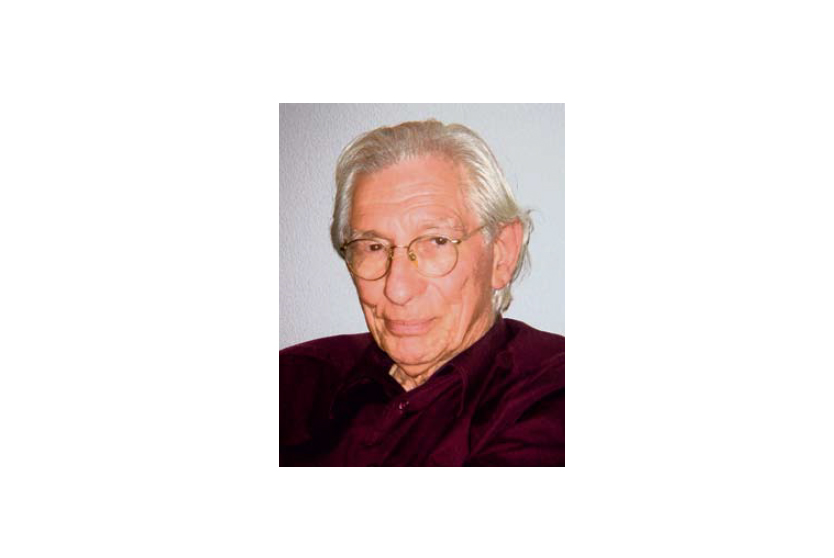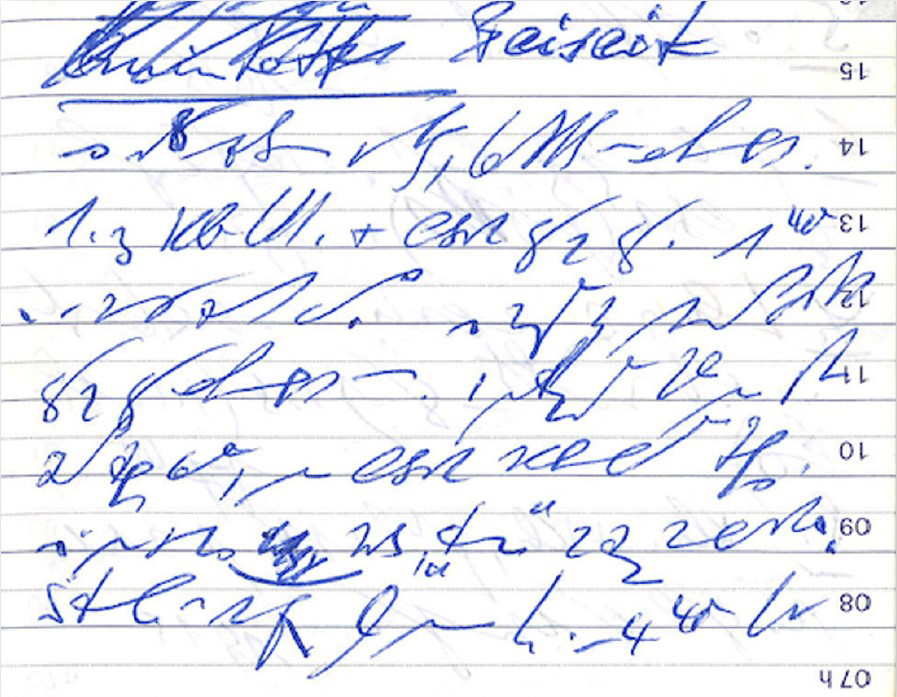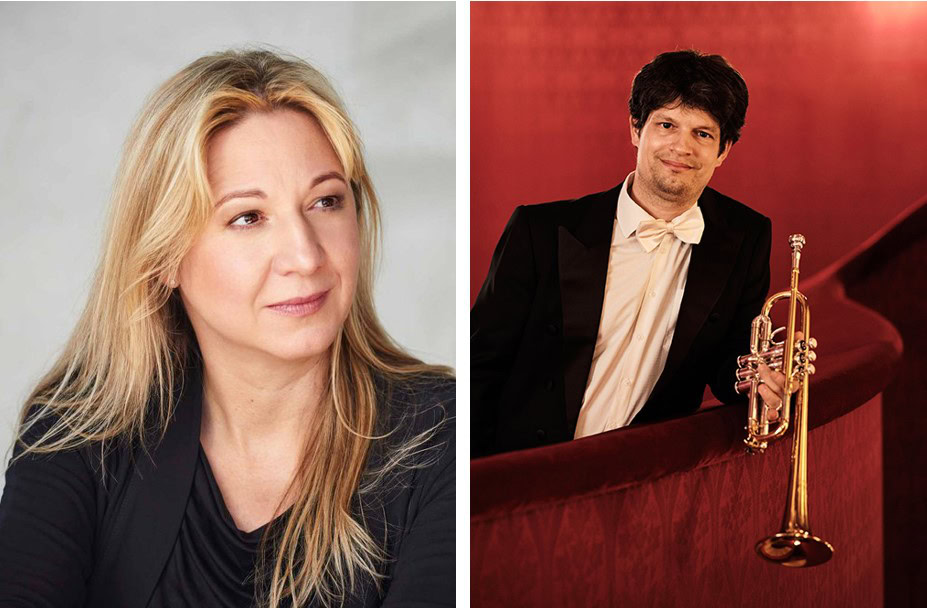Fritz Muggler: chronicler of post-war modernism
The art critic and organist Fritz Muggler died on September 25, 2023 at the age of 93, according to obituaries in the NZZ.

Born in Zurich in 1930, Fritz Muggler studied piano, school music, organ and later musicology at the University of Zurich with Paul Hindemith and Kurt von Fischer, as well as art history, journalism, music theory and composition. He was organist in Schlieren for 35 years and wrote for various newspapers, including the NZZ. He studied recorder with Hans Martin Linde at the Schola Cantorum Basiliensis. He founded the NewConsortZurich, an ensemble for early music in combination with contemporary music. He attended the Darmstadt Summer Courses for New Music for many years. He also chaired the Swiss section of the International Society for New Music (IGNM).
In January 2008, the SMZ a music protocol with Fritz Muggler by Johannes Anders. It contains somewhat more detailed information about his biography (Download PDF).
Fritz Muggler has reported on the Donaueschingen Music Days in the SMZ for many years. Some PDFs for download:
Chronicler of post-war modernism
Obituary for Fritz Muggler by Max Nyffeler
(published slightly abridged in the Swiss Music Newspaper 12/203 of November 29, 2023, p. 31 f.)
Comprehensively educated music critics who are equally well versed in early and contemporary music and are also active as practical musicians are rather rare today. Fritz Muggler, who died in Zurich on September 25 at the ripe old age of 93, was one of them. The public hardly noticed. He had long since retired from the critics' business and only appeared at concerts that interested him personally. And as far as contemporary music was concerned, these were fewer and fewer; he let the latest developments pass him by.
Contemporary of the post-war avant-garde
Born in 1930, Fritz Muggler belonged to the same age cohort as the protagonists of the post-war avant-garde: Ligeti, Stockhausen, Nono, Boulez, Kagel, Schnebel ... He trained his criteria on their works. He had acquired in-depth musical knowledge during his piano and organ studies at the Zurich Conservatory and in musicology with Paul Hindemith, who taught at the University of Zurich from 1951. However, as a young, curious musician, he also attended the Darmstadt Summer Courses at an early age. This made him one of the few connoisseurs of the emerging serialism of the time. I gained an impression of his expertise at the beginning of the 1960s when, as a budding musicologist, I took part in a seminar on music in the 20th century with Kurt von Fischer in Zurich - an absolute novelty at a university at the time. At this seminar, von Fischer invited Muggler to give a guest lecture on Stockhausen - he himself was not so well versed in this new subject. Muggler's appearance was a benefit for everyone.
His professional career spanned more than half a century. After journalistic beginnings with the daily newspapers National law and The deed he was appointed in the Neue Zürcher Zeitung for decades to become an important voice for all things contemporary, and he also wrote a great deal for the Swiss Music Newspaperor later for the Swiss Music Newspaper. He was always there when there was something new to hear, whether at home or abroad. At one meter ninety, he was an unmissable figure, and as a conversationalist he was exceptionally friendly - an attentive listener who was tolerant of other opinions and discreetly withdrew his own ego. As a wide-awake music critic, he noted down his impressions and reflections at the moment of listening - in shorthand, so that he could keep up with the music in writing. His notebooks are a huge store of knowledge acquired through listening and must have filled shelves.

Facts instead of opinions
Excited disputes about right and wrong, once a specialty of avant-garde circles, were just as little his cup of tea as criticism or its opposite, today's widespread pandering and frenemy journalism. Nor did he engage in socio-political debates, a perennial topic in feature pages and specialist circles after 1968, and their by-product, book-filling theorizing. He preferred to stick to the recognizable facts and sound results and strove to communicate them to his readers in simple and clear language. His role was that of the rationally arguing observer, open to anything new, who put his impressions and reflections down on paper in a matter-of-fact, modest tone - more of a soberly judging recorder of events than an advocate of artistic utopias. With this attitude and his profound knowledge, Muggler became an important chronicler of post-war modernism.
Sharp statements
For all his liberalism, he did not shy away from sharp statements. His reports from the Donaueschingen Music Days, which he organized until 2012 in the Swiss Music Newspaper are a treasure trove of pointed criticism. A few tidbits (from the PDFs listed above for download):
- The composition Apon by Beat Furrer also ran itself to death in the small sound groups, which then always gave the speaker space for a text that you still couldn't understand. Furrer tried to recreate the sound of speaking orchestrally, which he obviously did not succeed in doing.
- About Bernhard Lang, Monadology IXThe constant small-scale repetitions, which seem chatty and don't bring anything new, get on your nerves in a good 65 minutes.
- A fundamental problem for many composers in post-modern orchestral music, however, is filling the body of sound, which used to be done with chordal material. Both the Italian Aureliano Cattaneo (...) and the Paris-born Franck Bedrossian in Itself accomplish this with simple groups of notes that are endearingly banal, with the latter's blah-blah interspersed with awkward bursts of power. This is music that obviously doesn't expect you to listen to the details, that only cares about the superficial.
Condemnation and praise in the same breath
But in the same breath, the master of the succinct critique also knew how to praise:
- About Isabel Mundry, Me and youThe piano, even if soloistic and extremely virtuosic, is totally integrated into very precisely eavesdropped, beautifully balanced, highly complex sound combinations with a whirring, interwoven piano sound. In contrast, Enno Poppe in Old building with tonal gimmicks and imbalances.
- What Jennifer Walshe, Clara Maïda and Iris ter Schiphorst demanded was completely unimaginative, eternally repetitive, yet highly demanding singing, pimped up for fun with gestural, mimic and percussive actions, and only the Berliner Sarah Nemtsov with her Hoqueti was to be taken seriously in her typesetting skills and sensibly used additional effects.
- About Globokar, Radiographie d'un romanFor over three quarters of an hour, it was incredibly dense and, despite the variety of sounds and actions, including theatrical elements, formally completely convincing. The enthusiasm of the audience, especially the young ones, was huge.
Organist, IGNM President and radio critic
In addition to his profession as a music critic, Fritz Muggler was also very active. He studied recorder with Hanns-Martin Linde at the Schola Cantorum Basiliensis and then founded the New Consort Zurich, as well as playing the organ in a church in Schlieren. His commitment to contemporary music found its organizational expression in his many years as president of the Swiss section of the International Society for New Music (IGNM) and as director of the IGNM World Music Festival, which took place in Zurich in 1991.
Muggler also focused intensively on the topic of music in the media. In the NZZ he published detailed radio reviews for many years, a type of text that would be important in the media age, but unfortunately no longer finds a place in the print media today. And what goes far beyond the scope of music criticism: as a passionate radio listener, he recorded countless music programs from Swiss, German and Austrian stations between 1954 and 1991, creating a unique archive of sounding documents.
Securing the legacy
The material has been conserved and inventoried since 2016 as part of a research project by the Zurich University of the Arts with the support of Memoriav, the association for the preservation of Switzerland's audiovisual cultural heritage; it will be available to interested parties on request in future. Originally, it comprised a total of 946 analog tapes with over 18,000 pieces of music from the Middle Ages to the present day, jazz and ethnomusicology. According to project manager Lukas Näf, a few hundred more tapes will now be added following a thorough review of the estate.
In addition, Muggler's extensive written legacy will also be evaluated and inventoried. Näf hopes that the huge amount of information that the tireless journalist has absorbed over the decades, both at home and abroad, and incorporated into his texts will provide a wealth of insights into recent Swiss music history. An initial project entitled "Heard abroad" will use Muggler's writings to document the presence of Swiss composers and performers at international new music festivals. A long-term side effect of such activities: As the collection and preservation of cultural data used to be criminally neglected by the responsible institutions in Switzerland, the evaluation of private sources now offers the opportunity to at least somewhat compensate for the omissions and thus strengthen historical awareness.
Fritz Muggler's archive will be a treasure trove for anyone who wants to delve into the recent history of music and its interpretation, as well as the changing musical tastes of the time. The sprightly author and collector, who is well over 80 years old, personally supervised the initial archiving work at the ZHdK. The results of his lifelong work as a chronicler in sound and writing will keep his memory alive.
Fritz Muggler's tape collection at the ZHdK:
https://www.zhdk.ch/forschungsprojekt/tonbandsammlung-fritz-muggler-553597
Research project "Heard abroad":








